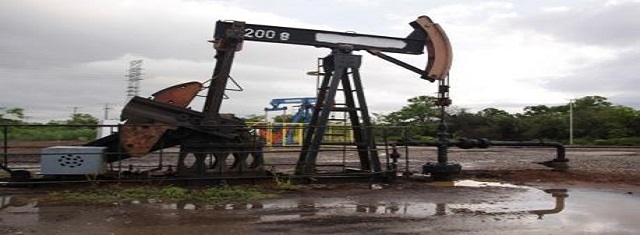News
Oil dips on Buzzard restart, Iraq; U.S. crude tests below $50
WORLD NEWS

An oil pump is seen in Lagunillas
USPA NEWS -
Oil prices dipped on Monday, with U.S. crude briefly falling below $50 per barrel, on news of the impending restart of Britain's Buzzard oilfield and Iraq's wish to be exempted from OPEC production cuts.
Buzzard, the North Sea field that contributes to the Forties crude stream and which pumps about 180,000 barrels per day (bpd), will restart on Tuesday or Wednesday, from a month-long planned maintenance, an industry source said.
Iraq's oil minister Jabar Ali al-Luaibi said the second-largest producer in the Organization of the Petroleum Exporting Countries (OPEC) wanted to be exempt from output curbs as it needed more money to fight Islamic State militants.
Iraq's oil minister Jabar Ali al-Luaibi said the second-largest producer in the Organization of the Petroleum Exporting Countries (OPEC) wanted to be exempt from output curbs as it needed more money to fight Islamic State militants.
OPEC hopes to remove about 700,000 bpd from an estimated global supply of 1.0-1.5 million bpd. Details of how much each member should cut have been left to its meeting in Vienna on Nov. 30.
Brent, the international benchmark for crude, settled down 32 cents, or 0.6 percent, at $51.46 a barrel. Its session low was $50.50.
U.S. West Texas Intermediate (WTI) crude fell 33 cents, or 0.7 percent, to settle at $50.52.
WTI slid below $50 for the first time since Oct. 18, hitting a session low of $49.62, as some players locked in profits from oil's climb of more than $5 a barrel, or about 13 percent, over the past month
Brent, the international benchmark for crude, settled down 32 cents, or 0.6 percent, at $51.46 a barrel. Its session low was $50.50.
U.S. West Texas Intermediate (WTI) crude fell 33 cents, or 0.7 percent, to settle at $50.52.
WTI slid below $50 for the first time since Oct. 18, hitting a session low of $49.62, as some players locked in profits from oil's climb of more than $5 a barrel, or about 13 percent, over the past month
"We're seeing some length exiting the market," said Pete Donovan, broker at New York's Liquidity Energy.
In Forties crude, which influences pricing for Brent, differentials were at their weakest in two weeks pending the restart of the Buzzard field.
"Obviously, it means increased supply for Brent versus what had been the status quo," said David Thompson, executive vice-president at commodities-focused broker Powerhouse in Washington.
A Reuters poll showed that U.S. crude inventories were also forecast to have risen last week by a likely 800,000 barrels, after a fall of more than 5 million barrels in the week to Oct. 14. [EIA/S]
In Forties crude, which influences pricing for Brent, differentials were at their weakest in two weeks pending the restart of the Buzzard field.
"Obviously, it means increased supply for Brent versus what had been the status quo," said David Thompson, executive vice-president at commodities-focused broker Powerhouse in Washington.
A Reuters poll showed that U.S. crude inventories were also forecast to have risen last week by a likely 800,000 barrels, after a fall of more than 5 million barrels in the week to Oct. 14. [EIA/S]
Still, losses in oil were limited by higher equity prices on Wall Street and by data from energy monitoring firm Genscape showing a weekly draw of about 1.0 million barrels of crude at the Cushing, Oklahoma, delivery hub for WTI. [.N]
The Seaway Crude Pipeline system, a 850,000-bpd system which moves crude from Cushing to Gulf coast refineries, was, meanwhile, set to reopen on Monday after being shut since Sunday.
Prices also pared losses towards the settlement as bulls gained more control.
It was "just short covering ... people were short and got squeezed out," said Jimmy Brunn, managing director at Forecast Trading Group in Suffern, New York.
The Seaway Crude Pipeline system, a 850,000-bpd system which moves crude from Cushing to Gulf coast refineries, was, meanwhile, set to reopen on Monday after being shut since Sunday.
Prices also pared losses towards the settlement as bulls gained more control.
It was "just short covering ... people were short and got squeezed out," said Jimmy Brunn, managing director at Forecast Trading Group in Suffern, New York.
Liability for this article lies with the author, who also holds the copyright. Editorial content from USPA may be quoted on other websites as long as the quote comprises no more than 5% of the entire text, is marked as such and the source is named (via hyperlink).





